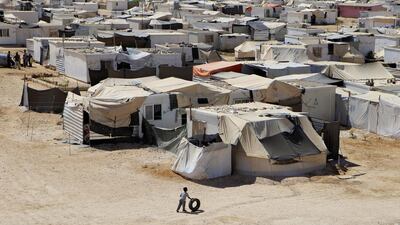MELBOURNE // Christians and Yazidis will be prioritised by the new Australian government as it begins processing Syrian refugees for resettlement, despite criticism from Muslim groups that the move is “bigoted”.
Australia announced this month that it would accept 12,000 Syrian refugees – out of more than 4 million who have fled the civil war – in response to the growing humanitarian crisis that has seen a mass influx of Syrians into Europe this year.
Then-prime minister Tony Abbott had indicated that minorities fleeing persecution from Syria would be given priority. That policy will continue under new prime minister Malcolm Turnbull, who toppled Mr Abbott in a party room coup a fortnight ago.
"There have been no changes to the current arrangements announced on September 9," an Australian government spokesperson told The National.
“Priority for these 12,000 places will be given to refugees who are deemed most vulnerable including women, children and families and those from persecuted minorities.”
The decision to prioritise minorities drew outrage from Australian Muslim associations, with local Islamic leader Ahmed Kilani slamming it at the time as “bigoted fear mongering”.
“You don’t ask a drowning person what your religion is before you save them,” Mr Kilani said in comments quoted by Australia’s Fairfax media.
Christians made up 10 per cent of Syria’s population before the civil war started in 2011. Since then, roughly 70 per cent of the two million Christians have fled, according to Father Samir Haddad, a Syrian priest with the Melkite Catholic Church.
“We Christians are not accepted in Syria,” said Father Haddad, a leading figure of the Syrian Christian community in Australia.
“Australia should give priority to the minorities because this country allows everyone to live according to their religious beliefs – in Syria, this is now not possible.”
Father Haddad, along with other Syrian and Lebanese Christian leaders in Australia, have been assisting the government since September 9 in locating and identifying displaced Christians.
Australian Muslim associations, however, say they have not been consulted by the government.
“The intake should be based on non-discriminatory criteria, not on religious grounds,” said Kuranda Seyit, of the Islamic Council of Victoria.
Mr Seyit disputed claims that minority groups in Syria were being persecuted, as extremist groups like Jabhat Al Nusra and ISIL rise in prominence.
“There is no evidence that Christians or Yazidis are being persecuted … The reality is that it is the Syrian people who happen to be Muslim who have been persecuted by the Assad regime,” he said.
Australia is screening for Syrian refugees in neighbouring Jordan, Turkey and Lebanon, with Mr Seyit stressing the government should take refugees from the camps in those countries.
Australia’s refugee intake will nearly double – from 13,750 people for 2015-16, to 25,750 in the next 18 months.
But Father Haddad, who spent a decade in Homs as a priest before migrating to Australia, argues Christians do not reside in refugee camps for security reasons.
“We have zero Christians in the camps. The refugee camps are not a good environment for Christians to feel safe. Usually they go to monasteries and churches,” he said.
The government spokesperson indicated Australia would broaden its search to include urban centres in neighbouring countries, where displaced Syrians from minorities are most likely to be situated.
“While some of the refugees chosen by Australia will be resettled from UNHCR camps, others will be resettled from the urban communities in Lebanon, Jordan and Turkey,” the spokesperson said.
Syria’s Christian community is among the oldest in the world, but it is rapidly diminishing as the horrors of war push many to flee. At least 60 churches have been damaged or destroyed by the fighting, with several clergymen kidnapped or killed by militants over the four years.
While the churches are assisting the Australian government in resettling refugees, they are deeply concerned for the future of Christianity in Syria.
“This is our country, we were the sons and daughters of this land before anyone else. Even if we’re helping people coming to Australia, we don’t want the Christians to leave the land, we want the name of Jesus Christ to stay in this land,” Father Haddad said.
foreign.desk@thenational.ae

